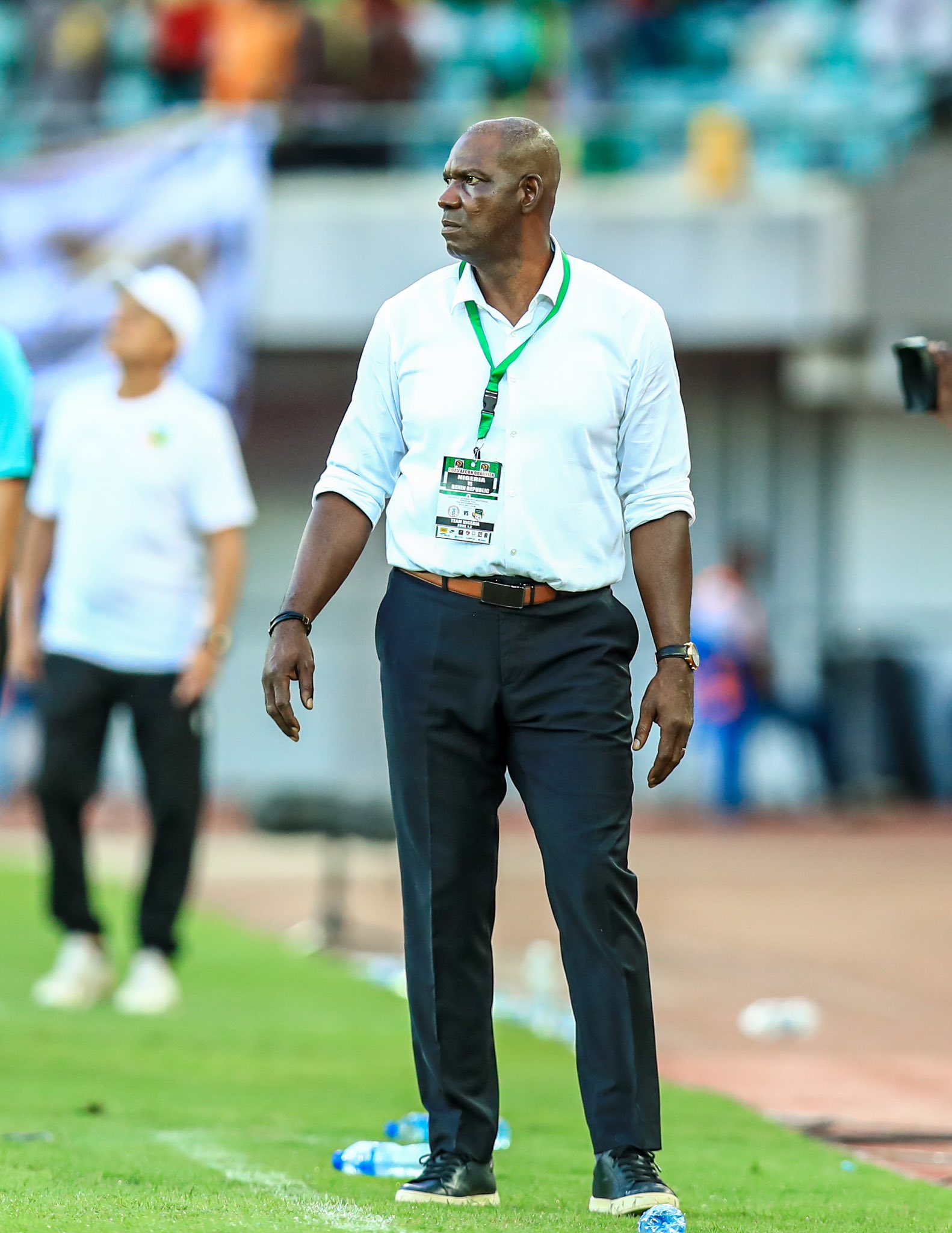Few managers have the unique knack for stepping into difficult situations and offering stability like Austin Eguavoen.
Time and again, the former Nigeria captain has been the go-to man for the Super Eagles during turbulent periods, and once again, he answered the call when Nigeria needed him.
With four points out of a possible six in the 2025 AFCON qualifiers, Eguavoen’s return to the touchline has been met with mixed emotions.
Against Rwanda, however, he showed both his tactical strengths and some areas of concern.
Here, we look at three things he did right and two he could have handled better.
What Eguavoen Did Right
Tactical Flexibility in Squad Rotation
Eguavoen’s decision to rotate the squad was both bold and tactical.

Dropping key players like Victor Osimhen to the bench to start Victor Boniface who has had a better preseason preparation with his club shows Eguavoen is not afraid to make the tough calls.
Fisayo Dele-Bashiru was also given the nod over Alex Iwobi as Evuavoen looked to try something different in Kigali.
While this move may raise eyebrows, it was a clear signal that Eguavoen understands the importance of squad depth, particularly when games come thick and fast.
The interim coach also showed good squad management as only three outfield players – Iheanacho, Tanimu, and Yusuf – did not play a minute of football over the two games.
Defensive Solidity
Despite some concerns surrounding Nigeria’s lack of midfield creativity, the Super Eagles kept a clean sheet against Rwanda.
That is the second consecutive clean sheet for the Super Eagles under Eguavoen, an improvement on the team’s poor record of zero clean sheets in four games under Finidi George.
The backline, led by William Troost-Ekong and reinforced by the solid presence of Semi Ajayi and Calvin Bassey, stayed compact and denied Rwanda any clear goal-scoring opportunities.
Eguavoen’s emphasis on defensive structure ensured that even when the team wasn’t firing up front, they remained resilient at the back.
Effective Use of Substitutions
Recognizing that the first half lacked the necessary sharpness in attack, Eguavoen made key substitutions early in the second half, bringing on Osimhen and Moses Simon.
This change injected energy into the team and nearly paid off. Osimhen’s presence immediately created problems for Rwanda’s defense, and Simon’s pace on the flank provided an additional outlet.
These subs almost turned the tide in Nigeria’s favour, showing that Eguavoen wasn’t afraid to alter his approach when things weren’t working.
Where Eguavoen Fell Short
Midfield Creativity
While Nigeria created several chances, the Super Eagles lacked real creativity in midfield.
Wilfred Ndidi, typically reliable, looked tired and struggled to offer the kind of forward-thinking play needed to unlock the Rwandan defense.
Fisayo Dele-Bashiru, who was given the nod ahead of Alex Iwobi, had a few bright moments but couldn’t replicate Iwobi’s vision and ability to carry the ball through midfield.
Eguavoen’s decision to bench Iwobi from the start left Nigeria lacking the creative spark needed to break down a resilient Rwandan side.
Inconsistent Pressing
While Eguavoen’s high-pressing game worked wonders against Benin, it was less effective against Rwanda.
Nigeria pressed in bursts but lacked the consistency to sustain pressure throughout the match.
This allowed Rwanda to grow into the game, particularly in the second half, when they controlled more possession. The disjointed press also left gaps in midfield, which the Rwandans occasionally exploited.
The Super Eagles’ inability to press cohesively and win the ball high up the pitch was a missed opportunity to dominate a technically inferior opponent
Final Thoughts
In the grand scheme of things, a goalless draw away from home against Rwanda isn’t a disastrous result for Nigeria.
Eguavoen’s return has been marked by solid defensive displays and some clever game management.
However, the lack of creativity in midfield and slow transitions highlight areas that need urgent attention.
The Super Eagles boss must find a way to bring out the best in his attacking players while ensuring that his team controls the tempo of games from start to finish.
For now, the four points from six provide a solid foundation, but there’s still much work to be done if Nigeria is to secure their place at AFCON and beyond.
With Eguavoen at the helm, there’s cautious optimism, but only time will tell if he’s the man to guide the Super Eagles to the promised land.
